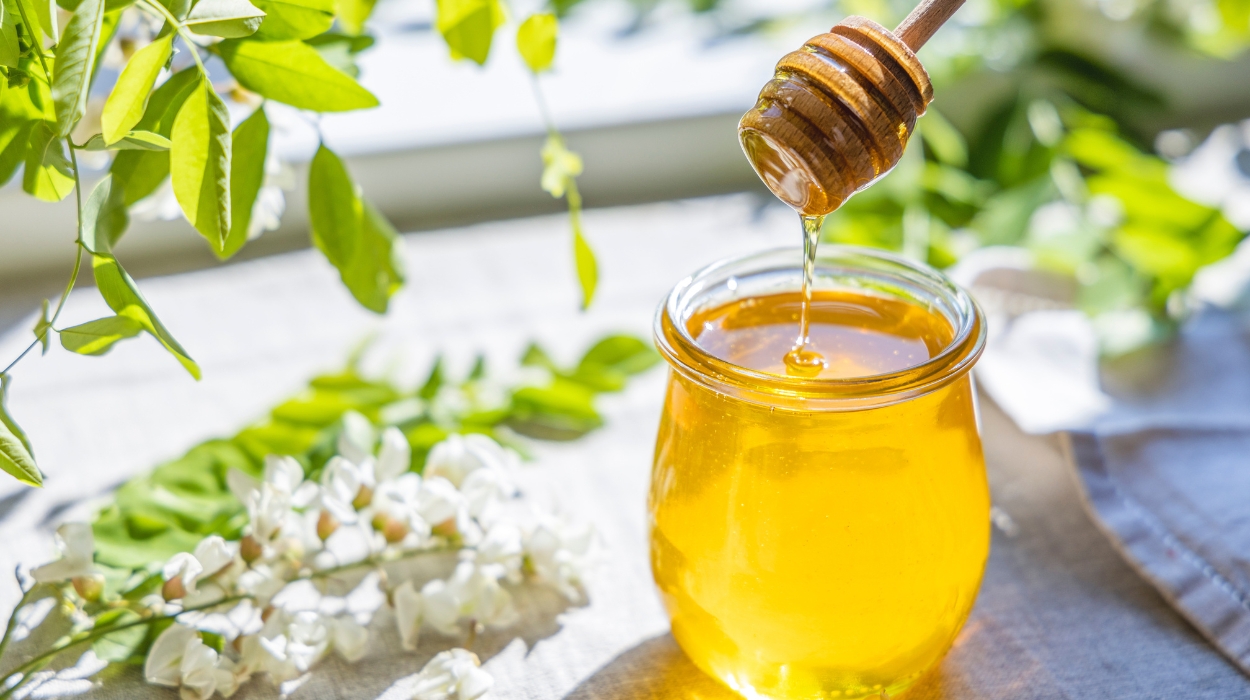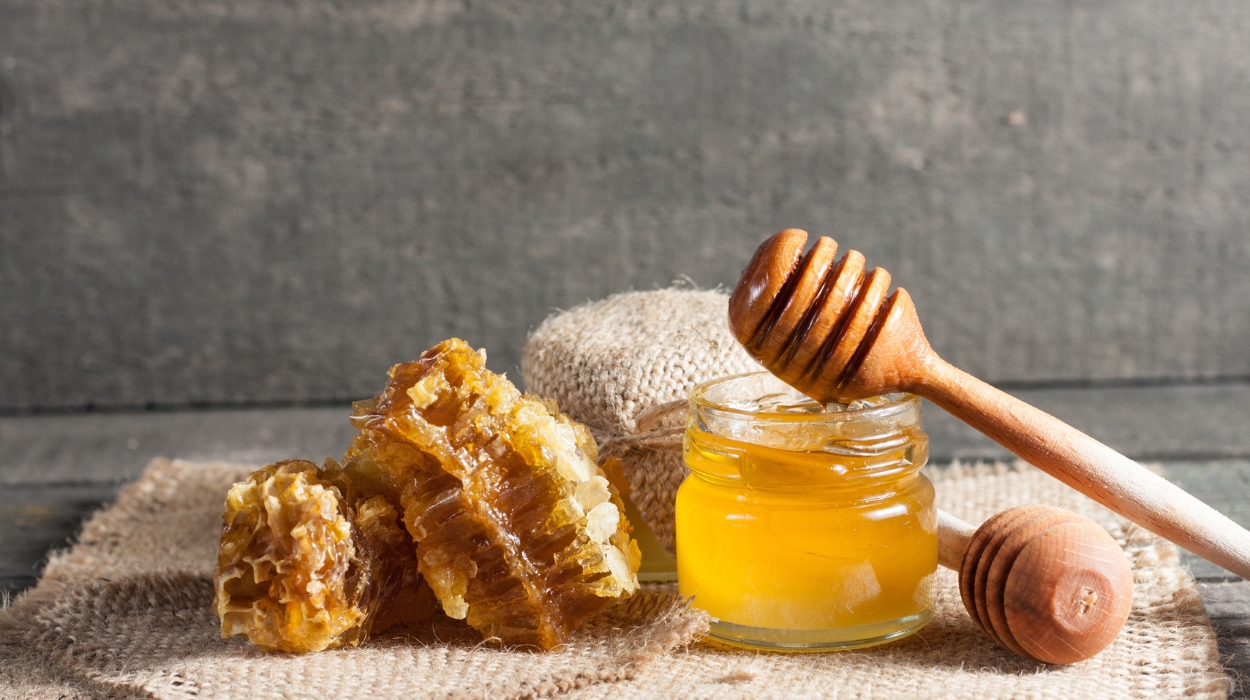 Expert's opinion
Expert's opinion
Expert's opinion
The article is a subjective view on this topic written by writers specializing in medical writing.
It may reflect on a personal journey surrounding struggles with an illness or medical condition, involve product comparisons, diet considerations, or other health-related opinions.
Although the view is entirely that of the writer, it is based on academic experiences and scientific research they have conducted; it is fact-checked by a team of degreed medical experts, and validated by sources attached to the article.
The numbers in parenthesis (1,2,3) will take you to clickable links to related scientific papers.
Is Honey Paleo? Benefits & How To Use It On The Paleo Diet 2024

Paleo diets[1] – otherwise known as the caveman diet – are rich in whole foods and avoid processed foods. It is based on what humans likely ate during the Paleolithic era. Some nutrition experts believe that if a caveman didn’t eat something, it was probably because it wasn’t naturally occurring, and thus we shouldn’t either.
The paleo diet encourages living like our ancestors, largely hunters and gatherers, relying solely on natural foods. Paleo principles suggest that our modern diets, like theirs, should primarily consist of full, unprocessed foods, like honey.
This article addresses the question, is honey paleo? We will discuss the many uses of honey, why it fits the paleo lifestyle, and how to include it in your daily routine. In addition, we will explore acceptable paleo sweeteners and summarize key takeaways.
Can You Have Honey On Paleo Diet?
Yes. Honey is a paleo-friendly diet due to its natural origins and minimal processing. Raw honey is a great alternative to refined sugar and sweeteners if following a paleo lifestyle. Also, consuming high-quality honey has been associated with multiple health benefits.
Why Is Honey Paleo-Friendly?

Scientists think humans were already eating honey during the Stone Age, around 8000 years ago.[2] The Paleolithic period was much earlier than that. Nevertheless, it is possible that people had access to honey and other bee products during Paleolithic times.
Aside from raw honey, other types of honey are not paleo, nor are foods that contain them. Refined sugar is not permitted on a paleo diet, and some types of honey might have other sugars added to them.
Health Benefits Of Honey
Honey is a good substitute for refined sugar since it is widely available and provides a range of vitamins, minerals, enzymes, and antioxidants.[3]
Studies show that honey has a variety of potential health benefits, including:
- A lowered risk of heart disease and diabetes.
- Improved intestinal health.
- Higher energy levels.
- Faster wound healing.
- Nourishes the skin and face.
Here is a brief discussion of the benefits of honey:
Maintains Heart Health
Unlike heavily processed foods, regularly eating honey – especially raw honey – is linked to improved cardiovascular health.[4] Eating high-quality honey might reduce risk factors for cardiovascular[5] diseases, such as high cholesterol and blood sugar.
Aids Digestion And Fat Metabolism
Honey has enzymes[6] that help the body metabolize complex carbohydrates, making it easier for the body to absorb the nutrients.
Honey might also support weight loss. The components in raw honey may enhance the body’s ability to lose weight[7] by decreasing appetite and overall calorie intake while increasing insulin sensitivity.
Provides Energy
Honey is largely made up of simple sugars like fructose and glucose,[8] which the body quickly absorbs and utilizes as fuel.
Contains Antibacterial Properties
Honey has antimicrobial and antibacterial properties.[9] It can kill dangerous yeast and bacteria due to its unique chemical composition.[10] It contains glucose oxidase and hydrogen peroxide and has a low pH level.
Promotes Fast Wound Healing
Honey’s anti-inflammatory and antimicrobial properties make it practical for wound healing.
Following any skin injury, bacteria may find their way to the wound site and cause an infection. Honey is useful in removing these bacteria[11] and speeds up skin wound healing rate.
And honey isn’t just helpful in healing external wounds. Animal studies suggest that eating honey can reduce gut inflammation[12] and improve the healing of stomach ulcers, too.
Nourishes The Face And Skin
Honey’s hydrating and nourishing[13] characteristics make it an excellent skincare ingredient. It is an effective natural moisturizer for dry skin and is simple to use. Raw honey can also help heal cracked lips during the winter.
Supports Oral Health
Due to its antibacterial properties, honey might also support a healthy oral microbiome and reduce dental plaque.[14] However, more research is needed before honey may be recommended as a therapy against oral diseases.[15]
Finally, honey might be an effective natural therapy for reducing oral mucositis[16] – inflammation of the mouth – during radio- and chemotherapy.
How To Add Honey To The Paleo Diet

Many nutrition experts consider raw honey a healthy food because of its anti-inflammatory and healing properties. Hence, paleo food products containing honey, such as paleo supplements, are popular worldwide. Here are the most exciting paleo recipes and food ideas to easily add honey to your daily diet:
Honey With Hot Water
To start a paleo diet, you should first make a meal plan. Paleo principles suggest that your first meal should be healthy and light. Warm water with honey provides minerals and antioxidants that promote health.
As A Natural Sweetener
Honey is a healthier alternative to table sugar or other natural sweeteners. Although honey is mostly glucose and fructose, good quality honey also provides minerals like iron, potassium, and calcium. It is undeniably a superior substitute for white sugar, especially in hot drinks such as green tea, black tea, and other flavored teas.
As A Salad Dressing
Salads are great when served with the right dressing! Honey can enhance your salad dressing, both in flavor and nutritional content.
In a jar, add equal parts honey, balsamic vinegar, and vegetable oils; season with your favorite herbs and a pinch of salt to taste. Close the jar tightly and shake briskly, or mix with a spoon.
As A Baking Ingredient
Although grains are prohibited in the paleo lifestyle, several grain-free baking recipes use alternative flours such as almond or coconut. As a natural sweetener, honey is used instead of white sugar in many recipes.
Other Paleo-Friendly Sweeteners
Even though honey is paleo, it’s nice to have options. In addition to honey, you could try these other paleo-friendly sweeteners:
The Monk Fruit
The monk fruit is a natural Southeast Asian plant that is sweeter and healthier than table sugar. It is a low-glycemic alternative to sugar because it has no calories. Those aiming to lose weight may benefit by substituting monk fruit for table sugar and other high-calorie sweeteners.
Lucuma Powder
Lucuma powder is derived from the lucuma fruit from South America. Because of its sweet taste and potential health benefits, lucuma powder has become a popular alternative to refined sugar and artificial sweeteners. Lucuma is naturally gluten-free and vegan; you can obtain certified organic lucuma powder.
Coconut Sugar
Coconut sugar, derived from coconut palm trees’ sap, is another popular paleo sweetener. Because of its low glycemic index, it can be used instead of white sugar to make recipes healthier.
Raw Maple Sap
Native Americans have used maple syrup as a sweetener for millennia, as it is made from 100% pure maple tree sap. It’s thick and sticky in its unprocessed state, with a tinge of sweetness. The sap must be boiled down to a minimal volume to make maple syrup. Use maple syrup or sap to sweeten your paleo recipes.
Jerusalem Artichoke Syrup
Because of its sweet flavor and low glycemic index,[17] soluble Jerusalem artichoke[18] is ideal for people with type 2 diabetes and paleo dieters. Artichoke syrup may help the good bacteria in your gut since it is high in inulin, a prebiotic[19] that provides energy for probiotics.
Dates
Dates[20] are versatile fruits that can sweeten many dishes. They are used to produce natural sweeteners like date syrup.
Conclusion
Raw honey is paleo and a healthy alternative to other sugars. If following a paleo lifestyle, you should eat raw honey, as other types of honey might not be paleo. The paleo diet is beneficial because it recommends eating whole foods in their most natural state.
Because of its rich flavor and health benefits, honey is highly popular worldwide. Include honey in your daily diet to help you maintain overall health. However, remember that honey is mostly sugar, so consume it in moderation like all sweet foods.
+ 20 sources
Health Canal avoids using tertiary references. We have strict sourcing guidelines and rely on peer-reviewed studies, academic researches from medical associations and institutions. To ensure the accuracy of articles in Health Canal, you can read more about the editorial process here
- Singh, A. and Singh, D. (2023). The Paleolithic Diet. Cureus. [online] doi:https://doi.org/10.7759/cureus.34214.
- Eteraf-Oskouei, T. and Najafi, M. (2013). Traditional and modern uses of natural honey in human diseases: a review. Iranian journal of basic medical sciences, [online] 16(6), pp.731–42. Available at: https://www.ncbi.nlm.nih.gov/pmc/articles/PMC3758027/.
- Yazan Ranneh, Abdah Md Akim, Hasiah Ab Hamid, Huzwah Khaza’ai, Fadel, A., Zainul Amiruddin Zakaria, Albujja, M.H. and Mohd (2021). Honey and its nutritional and anti-inflammatory value. BMC Complementary Medicine and Therapies, [online] 21(1). doi:https://doi.org/10.1186/s12906-020-03170-5.
- Ruszymah Bt Hj Idrus, Sainik, V., Nordin, A., Aminuddin Bin Saim and Sulaiman, N. (2020). Cardioprotective Effects of Honey and Its Constituent: An Evidence-Based Review of Laboratory Studies and Clinical Trials. International Journal of Environmental Research and Public Health, [online] 17(10), pp.3613–3613. doi:https://doi.org/10.3390/ijerph17103613.
- Bobiş, O., Daniel Severus Dezmirean and Moise, A. (2018). Honey and Diabetes: The Importance of Natural Simple Sugars in Diet for Preventing and Treating Different Type of Diabetes. Oxidative Medicine and Cellular Longevity, [online] 2018, pp.1–12. doi:https://doi.org/10.1155/2018/4757893.
- Almasaudi, S.B. (2021). The antibacterial activities of honey. Saudi Journal of Biological Sciences, [online] 28(4), pp.2188–2196. doi:https://doi.org/10.1016/j.sjbs.2020.10.017.
- Muhammad Faiz Zulkifli, Mohd, Saludes, J.P., Dalisay, D.S. and Iryani, W. (2022). Potential of Natural Honey in Controlling Obesity and its Related Complications. Journal of Evidence-Based Integrative Medicine, [online] 27, pp.2515690X2211033–2515690X2211033. doi:https://doi.org/10.1177/2515690×221103304.
- Aljohar, H.I., Maher, H.M., Jawza Albaqami, Maha Al-Mehaizie, Rawan Orfali, Razan Orfali and Alrubia, S. (2018). Physical and chemical screening of honey samples available in the Saudi market: An important aspect in the authentication process and quality assessment. Saudi Pharmaceutical Journal, [online] 26(7), pp.932–942. doi:https://doi.org/10.1016/j.jsps.2018.04.013.
- Najla Abdullah Albaridi (2019). Antibacterial Potency of Honey. International Journal of Microbiology, [online] 2019, pp.1–10. doi:https://doi.org/10.1155/2019/2464507.
- Mandal, M. and Mandal, S. (2011). Honey: its medicinal property and antibacterial activity. Asian pacific Journal of Tropical Biomedicine, [online] 1(2), pp.154–160. doi:https://doi.org/10.1016/s2221-1691(11)60016-6.
- Wang, C., Guo, M., Zhang, N. and Wang, G. (2019). Effectiveness of honey dressing in the treatment of diabetic foot ulcers: A systematic review and meta-analysis. Complementary Therapies in Clinical Practice, [online] 34, pp.123–131. doi:https://doi.org/10.1016/j.ctcp.2018.09.004.
- Harakeh, S., Saber, S.H., Isaac Oluwatobi Akefe, Shaker, S., Hussain, M., Almasaudi, A.S., Shimaa M.M. Saleh and Almasaudi, S.B. (2022). Saudi honey alleviates indomethacin-induced gastric ulcer via improving antioxidant and anti-inflammatory responses in male albino rats. Saudi Journal of Biological Sciences, [online] 29(4), pp.3040–3050. doi:https://doi.org/10.1016/j.sjbs.2022.01.031.
- Burlando, B. and Cornara, L. (2013). Honey in dermatology and skin care: a review. Journal of Cosmetic Dermatology, [online] 12(4), pp.306–313. doi:https://doi.org/10.1111/jocd.12058.
- Juraj Deglovic, Majtánová, N. and Juraj Majtán (2022). Antibacterial and Antibiofilm Effect of Honey in the Prevention of Dental Caries: A Recent Perspective. Foods, [online] 11(17), pp.2670–2670. doi:https://doi.org/10.3390/foods11172670.
- Romário-Silva, D., Severino, Bueno‐Silva, B., de, J., Franchin, M., Durrer, R., Ellen and Pedro Luiz Rosalen (2022). Antimicrobial Activity of Honey against Oral Microorganisms: Current Reality, Methodological Challenges and Solutions. Microorganisms, [online] 10(12), pp.2325–2325. doi:https://doi.org/10.3390/microorganisms10122325.
- Yang, C., Gong, G., Jin, E., Han, X., Yang, Z., Yang, S.-H., Song, B., Zhang, Y. and Piao, C. (2019). Topical application of honey in the management of chemo/radiotherapy-induced oral mucositis: A systematic review and network meta-analysis. International Journal of Nursing Studies, [online] 89, pp.80–87. doi:https://doi.org/10.1016/j.ijnurstu.2018.08.007.
- Yang, L., He, Q., Corscadden, K. and Udenigwe, C.C. (2015). The prospects of Jerusalem artichoke in functional food ingredients and bioenergy production. Biotechnology Reports, [online] 5, pp.77–88. doi:https://doi.org/10.1016/j.btre.2014.12.004.
- Chang, W., Jia, H., Aw, W., Saito, K., Hasegawa, S. and Kato, H. (2014). Beneficial effects of soluble dietary Jerusalem artichoke (Helianthus tuberosus) in the prevention of the onset of type 2 diabetes and non-alcoholic fatty liver disease in high-fructose diet-fed rats. British Journal of Nutrition, [online] 112(5), pp.709–717. doi:https://doi.org/10.1017/s0007114514001421.
- Pandey, K., Naik, S.R. and Vakil, B.V. (2015). Probiotics, prebiotics and synbiotics- a review. Journal of Food Science and Technology, [online] 52(12), pp.7577–7587. doi:https://doi.org/10.1007/s13197-015-1921-1.
- Tang, Z., Shi, L.-E. and Aleid, S.M. (2013). Date fruit: chemical composition, nutritional and medicinal values, products. Journal of the Science of Food and Agriculture, [online] 93(10), pp.2351–2361. doi:https://doi.org/10.1002/jsfa.6154.



